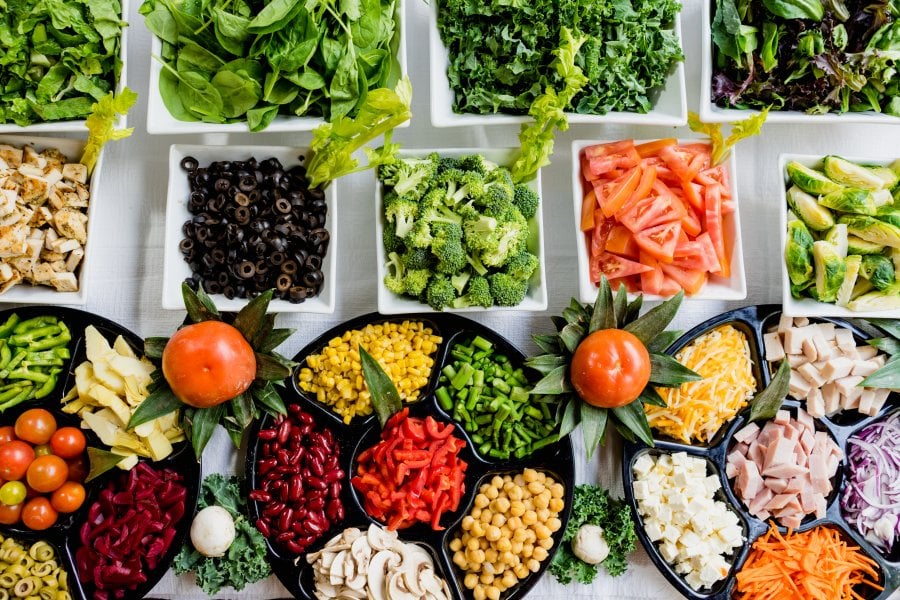
food
Global food systems are responsible for 24% of greenhouse gas emissions and over two thirds of global water use. This situation is not sustainable for the health of people and planet, but there are ways we can help. Opting for foods that are healthy and also more environmentally friendly is a good place to start, but how do we know what to choose?
The chefs and catering staff at LSHTM have developed the “Planetary Pick” meal, with the aim of promoting sustainable and healthy diets, and making more informed choices about what we eat. Planetary Pick is a meal choice or food option available in LSHTM Catering facilities, and includes salad boxes, hot meal options and canape selections, labelled with the Planetary Pick logo.
Image - The environmental impacts (water use and greenhouse gas emissions) and nutritional content (calories and fibre) of a Planetary Pick salad box, as compared to a ham and cheese sandwich. Environmental impacts are calculated according to foods consumed in the UK, hence some items are imported which is reflected in the environmental impact.
The Planetary Pick recipes follow the recommendations from the EAT-Lancet Commission report, which looked at sustainable and healthy diets and found a flexitarian diet to be the best diet for people’s health, and for the environment. The diet, known as, “Planetary Health Diet”, was the least likely to cause heart disease and some types of cancer, and had the lowest environmental impact. The flexitarian diet contains largely plant-based foods which require less resources such as land, water and fertilisers, and includes small amounts of fish, meat and dairy.
However, it’s difficult to say with certainty that some foods are good for the planet, and some are bad. Firstly, the environmental impact of a food varies widely depending on the place where it is grown. This will be due to the type of climate and soil, as well as the agricultural system. The greenhouse gas emissions of the average bean grown in the UK using lots of machinery and fertiliser will be much higher than food grown by a small-scale farmer that doesn’t have access to high tech resources (even after accounting for air miles).
It is very hard to understand the true environmental cost of products because the food system itself is very complex, with different parts dependent on each other. For example, we reduce the need for synthetic and manufactured fertiliser by recycling and re-using livestock manure. Changing the availability of this could have other environmental consequences.
It’s important to remember sustainability is not just about measuring the carbon footprint of a food product. There are other environmental issues such as, how much water is needed, the land required and if the food requires plastic packaging. Most the evidence thus far has focused on greenhouse gases of food products and diets, which means we don’t yet understand all the consequences from changing our diets. There are also other solutions that don’t involve changing our diets, for example food waste is a major problem in terms of environmental sustainability; every bit of food wasted is wasted carbon emissions and water use.
Although there is evidence that eating less red and processed meat is better for our health, the evidence around a full plant-based or vegan diet is mixed. More and more processed vegan products are being developed with high amounts of salt, sugar and saturated fat. Although they are marketed as vegan, they are not necessarily good for our health.
There may be no clear-cut answer to what food is best for our health and the planet, but this is a growing area of research interest, with new evidence and media attention emerging on a daily basis.
The school respects we all have a choice in what we eat. However, we want to start paving the way for change, and inspire people for a better future. The LSHTM Centre on Climate Change and Planetary Health supports the LSHTM catering team in their endeavours. This week is “Go Green Week” and today the catering staff are doing a vegetarian day to promote Planetary Pick. Led by Professor Alan Dangour, our team of food-systems researchers are working with David Cole and his catering team to help put research into practice.
As the school embarks on its ambitious Carbon and Energy Management Plan for 2020, the catering services will play a huge role in pushing this forward. Stay tuned for more to come in the future!
Francesca Harris, London School of Hygiene & Tropical Medicine
If you enjoyed this article and would like to build a career in global health, we offer a range of MSc programmes covering health and data, infectious and tropical diseases, population health, and public health and policy.
Available on campus or online, including flexible study that works around your work and home life, be part of a global community at the UK's no.1 public health university.

